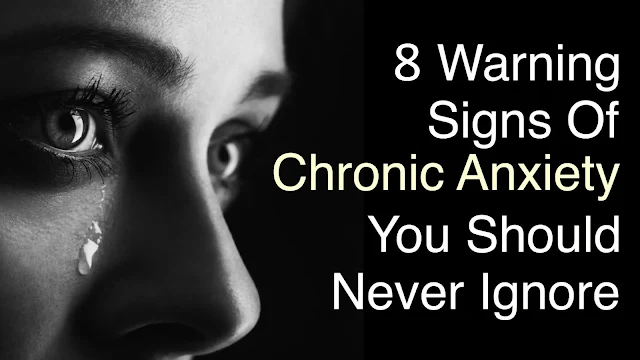One of the common anxiety disorders is chronic anxiety, which includes constant nervousness, worry, and tension, and it goes far beyond being nervous before a date or worrying about a work project. Chronic anxiety is an excessive, persistent, and intense problem which not only can disrupt your everyday life, but your health too.
Anxiety causes feelings of dread and of being overwhelmed, constant worry, and inability to relax. Anxiety can show physical symptoms, so it can affect your physical health as much as your mental health. Health. Although emotional and behavioral symptoms of chronic anxiety are well-known, the following eight physical symptoms can indicate an anxiety disorder.
1. Muscle Pain
Muscle pain is one of the most usual physical symptoms related to
anxiety. Besides causing pain in the muscles, stress can cause
inflammation too.
2. Headaches
Another common physical symptom of chronic anxiety are headaches. The
frequent headaches appear because of the tension in the muscles caused
by stress, and they can be further worsened by intake of excess
caffeine.
3. Fatigue
The stress from chronic anxiety can cause weakening of the adrenal
glands which are extremely important in keeping the balance and overall
health in the body. One result from the weakened adrenal glands can be fatigue.
4. Digestive Problems
Poor digestion and irritable bowel syndrome are related to chronic
anxiety. If the brain doesn’t function normally, the digestive system
will suffer too. Gastrointestinal tract produces the brain’s calming
neurotransmitter, serotonin, whose production can be lowered as a result
of poor digestion caused by anxiety.
5. Sugar Cravings
Since sugar causes sense of pleasure before causing harm in the body,
people with anxiety might crave for this white drug when experiencing
distress. This is not surprising as they want to feel a pleasurable
feeling when upset or stressed.
6. Trouble Sleeping
People who suffer from chronic anxiety can have real difficulties when
trying to fall asleep or just relax. The reason is because their brain
is rapidly firing, and just because it’s time for bed doesn’t mean it
will slow down.
7. Mood Swings
The patience is significantly lowered if the brain is laden with
negative or worrisome thoughts. People who suffer from chronic anxiety
might snap at or lash out at someone seeking for attention.
8. Lack of Focus
Since the brain of those suffering from chronic anxiety is loaded with
millions of other things, they might have difficulties in concentrating
or focusing. They may try to work something, but their mind will be in
some other place.
Although anxiety disorders can’t be quickly fixed, their symptoms might be kept at bay with a healthy and balanced lifestyle. Health. Those who suffer from anxiety should consult a doctor, and try to implement the following life changes:
- Limit caffeine
- Get enough sleep
- Consume a healthy, balanced diet
- Avoid nicotine and alcohol
- Exercise regularly
- Practice deep breathing
- Try meditation
- Identify unhealthy relationships
- Establish a reasonable schedule
- Know who to avoid when you’re feeling anxious
- When you start to feel overwhelmed, try to talk it out
